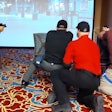The U.S. Department of Justice has filed a lawsuit against the Jerome County (Idaho) Sheriff's Office for violating the employment rights of an Iraq War veteran.
The sheriff's office allegedly fired Cpl. Mervin Jones as he recovered from knee injuries he suffered while deployed as an Army National Guard member in 2004.
Jones aggravated the injury during Guard training in 2008. The lawsuit also accuses the sheriff's office of failing to accommodate Jones as he recovered from the injury in 2009.
The lawsuit claims the sheriff's office violated the Uniformed Services Employment and Reemployment Rights Act of 1994 (USERRA).
"Members of the Army National Guard sacrifice time away from their jobs to serve their country," said U.S. Attorney for Idaho Wendy Olson. "USERRA ensures that they are not discriminated against after they have returned and their employment rights are protected. We are committed to vigorously enforcing USERRA's protections."
USERRA requires that service members who leave their civilian jobs to serve in the military be reemployed promptly by their civilian employers in the positions they would have held if their employment had not been interrupted by military service or in positions of comparable seniority, pay, and status, according to a DOJ release.
Under the law, service members who are recuperating from such an injury have up to two years to obtain reemployment without facing termination by their civilian employers.
Jones began working for the sheriff's office as a correctional deputy in 2002. He was promoted to corporal in 2007.
The complaint alleges that in 2009, while Jones was still recuperating from multiple knee surgeries, the sheriff's office forced him to complete Family Medical Leave Act (FMLA) paperwork even though his leave was protected under USERRA, denied him light duty work to accommodate his physical limitations caused by the knee injury, attempted to subject him to an unlawful "fitness for duty" evaluation and physical fitness test before allowing him to return to work, and terminating his employment during the period of time permitted by USERRA to recover from an injury incurred in the line of duty.















